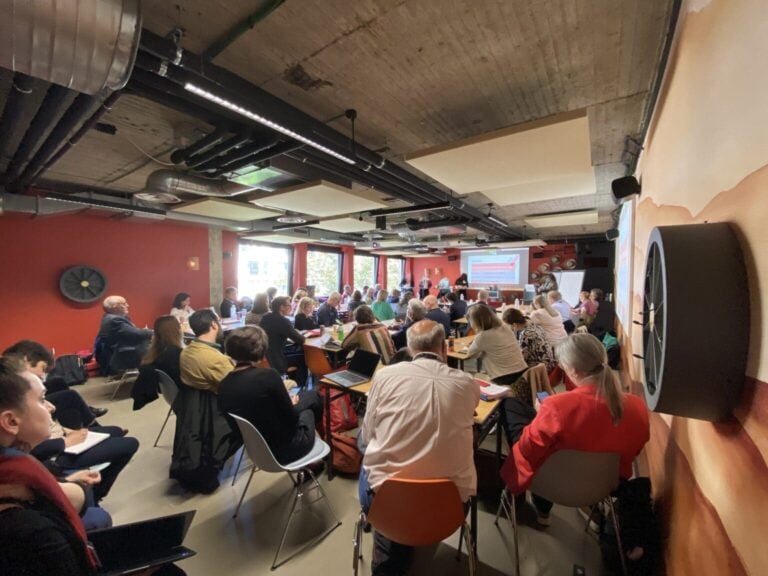On 29 May 2024, ACT Alliance EU hosted a roundtable event under Chatham House rules to explore the role of faith actors in advancing gender justice. Recognising that religious perspectives can both challenge and champion issues like Sexual and Reproductive Health and Rights (SRHR), Comprehensive Sexual Education (CSE), LGBTQI+ rights and democratic principles, the event brought together faith-based organisations, other NGOs, European Commission and European External Action Service delegates, and Permanent Representation representatives. Participants discussed how faith-based organisations are using methodologies for dialogue as well as theological reflections to engage with both faith and non-faith actors on gender justice. This includes identifying ways forward on contentious issues such as SRHR and LGBTQI+ rights amidst the growing backlash.
Impact of Global Trends on Gender Justice
The discussions provided a broad overview of how global trends such as rising nationalism, economic uncertainty, social and religious fundamentalism and increasing polarisation are affecting progress towards gender equality. These trends often exacerbate existing gender disparities and may hinder the enforcement of gender-focused policies. Participants discussed strategies to mitigate these impacts, emphasising the importance of international cooperation and solidarity among civil society and advocacy groups supporting gender justice and promotion of human rights. The funding for anti-rights movements has notably increased, being four times larger than it was 15 years ago, profoundly impacting areas such as Sexual and Reproductive Health Rights (SRHR), CSE, and LGBTQI+ rights.
Role of Faith Actors in Gender Justice
Participants extensively discussed the diverging outcomes of the roles played by faith-based organisations, religious leaders, and faith communities in advancing gender justice. While some may perpetuate traditional roles that restrict gender equality, others actively challenge gender norms and advocate for transformative justice. The capacity of progressive faith actors to use their influential positions and unique vantage points within communities to effect concrete change— purposefully engaging also with engaging boys and men and addressing reservations made under the CEDAW[1]—emerged as a key theme, vividly illustrated through examples from ACT Alliance members’ programmes (available in a downloadable booklet).
Strategies for Engagement and Advocacy
A part of the event was dedicated to formulating strategies for engaging with faith actors on the promotion of gender equality. The discussions highlighted the backlash characterised by misuse of religion, patriarchy, polarisation, protectionism, post-truth, and the significant funding increases for anti-rights movements. Creating inclusive platforms that respect and integrate diverse religious beliefs into gender justice campaigns was emphasised as crucial. Additionally, addressing the growth of fundamentalisms and the role of religious actors in reaching the “silent movable middle” were identified as pivotal areas for strategic focus. Insights from a recent study on “Religion and Gender in Donor Policies and Practice” (2024) indicated that the current donors’ engagement strategies are often reliant on individual commitment, highlighting the necessity for structured support and leadership in mobilising faith-based initiatives to effectively counteract polarisation. The positive role of donor initiatives was also underscored, with specific mention of the EU-UN Spotlight initiative as a leading example of effective donor engagement with faith actors to combat gender-based violence.
Overcoming Resistance
The conversation acknowledged the resistance from both within and outside faith communities. Participants shared their experiences and lessons learned in dealing with opposition, highlighting the importance of dialogue, education and theological reflections, and strategic alliances. Tailored approaches that consider the specific cultural and religious contexts of each community were emphasised as essential for overcoming barriers to gender justice. The importance of protecting the secularity of the state was also discussed, underscoring the need to differentiate between ‘rights issues’ and ‘faith issues’ in public policy debates.
Conclusion
The event underscored the pivotal role that faith-based organisations can play in advancing gender justice globally. By embracing a collaborative and inclusive approach, these organisations can contribute significantly to the movement towards equality. The discussions made clear that while challenges remain, there is a strong collective commitment to engage with faith-based organisations in promoting gender equality.
[1] In the context of CEDAW – Convention on the Elimination of All Forms of Discrimination Against Women, many countries have made reservations that are often based on religious or cultural beliefs.



